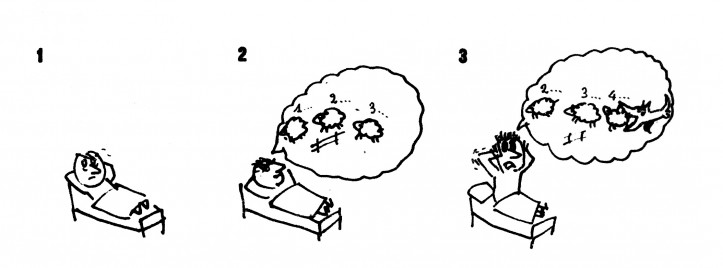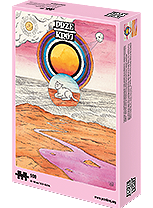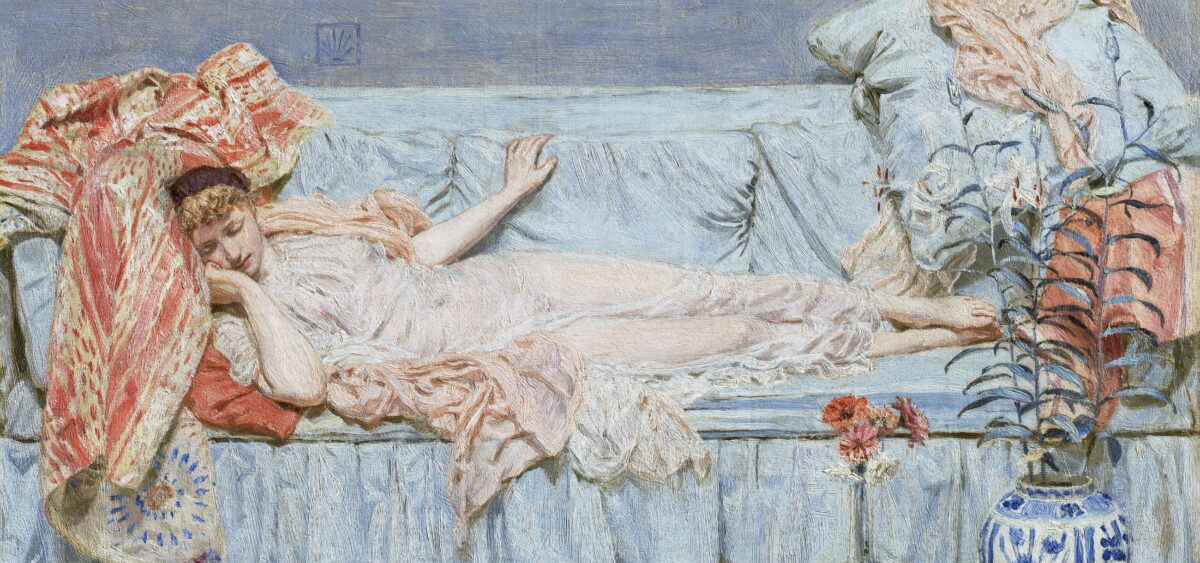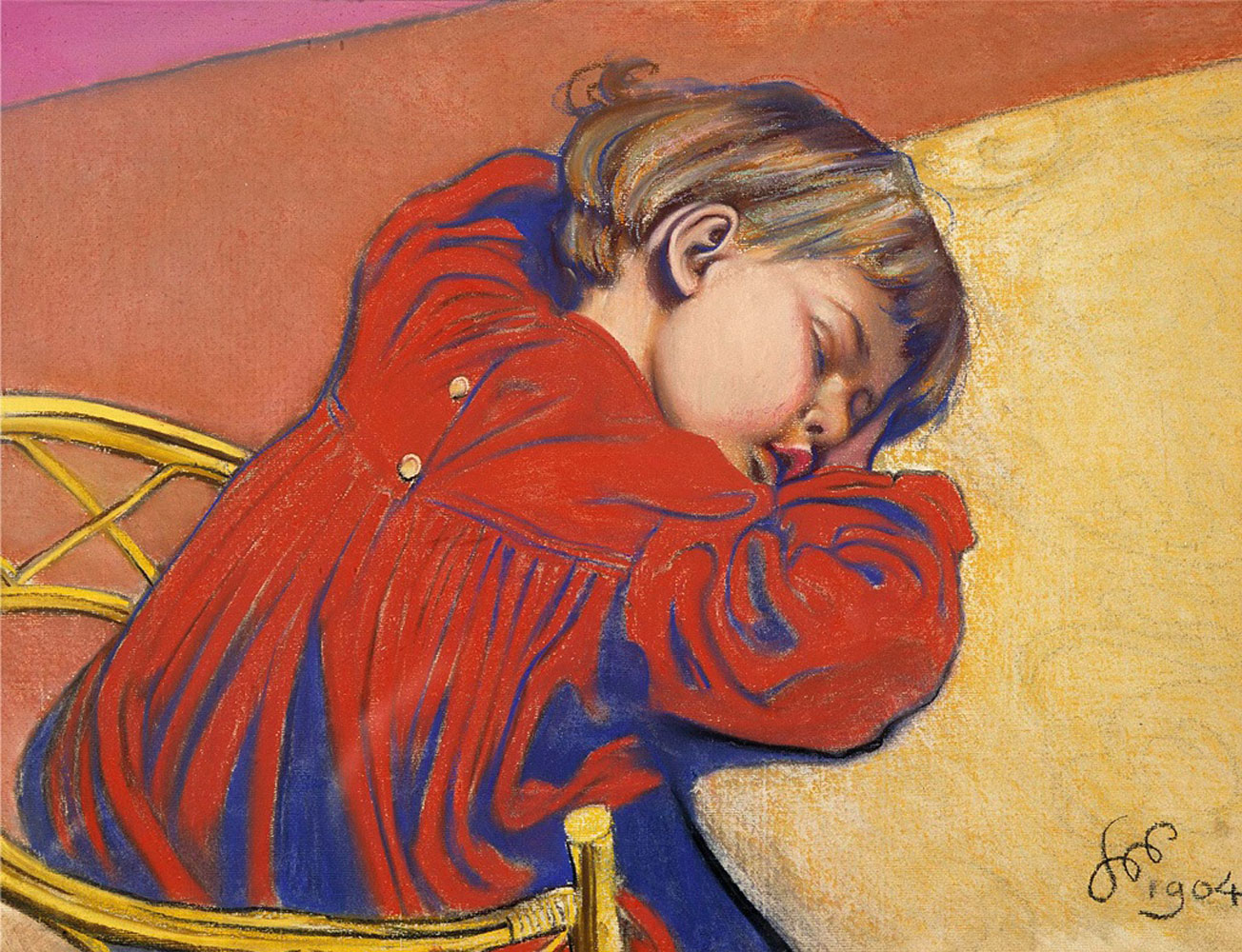
If you only indulge in the luxury of a nice long sleep on the weekend, read to the end. If you can’t imagine a day without coffee, you should also stick around to the last word. And if you love to sleep, learn how much wisdom there is in that feeling.
Good sleep is rare in today’s world. We don’t sleep long enough or deeply enough, and we’re more and more in standby mode. Hounded by the idea that time is money, we try to be as efficient as the devices that surround us.
Many of us have learned to live with a lack of sleep every day, as if its duration and quality depended on our whims and were subject to individual negotiation, with no consequences. In fact, most people need from seven to nine hours a day of sleep in order to function. Those who can permanently get by with barely five or six hours are a minority, as are those who require a significantly longer slumber in order to feel good.
For most of history, people slept as long as they needed to. It was only the age of steam and electricity, the standardization of clocks and the introduction of shift work in factories that changed the rules of the game. The Industrial Revolution attacked the natural need for sleep; we have been demanding ever greater compromises ever since. The factory whistle would pull the entire workers’ neighborhood out of bed, and today we’re awakened by the alarms in our smartphones. And not just once: we hit the snooze button to wake us up again after a few minutes, which causes renewed stress and an extra shot of adrenaline. The mere fact that we need to be shaken several times to get out of bed should make us reflect on how much we’re working against our body.
According to Jonathan Crary, author of 24/7: Late Capitalism and the Ends of Sleep, it will only get harder for us to get good sleep—meaning the long, deep, and uninterrupted kind. Developed markets are already moving toward a 24-hour economic model and the shortening of daily shut-eye, having successfully monetized all other areas of life. The requirement of ceaseless productivity, the demand for continual selling of products and services, and finally globalization and the virtualization of the economy, which means that online it’s always day and nothing ever closes, are clearing the way for an attack on sleep as the last bastion of non-monetized existence.
It often feels increasingly hard to sleep peacefully, long, and without feeling that we’re missing something. Various studies place this experience within a broader trend: people are sleeping less and less, harming their health and quality of life. Only a few experiments (now prohibited by ethical rules) conducted on both humans and animals have also shown that chronic sleep deprivation can lead to ruinous effects and even earlier death.
The vast majority of species on Earth sleep in some way. But the process, as Matthew Walker explains in the popular science bestseller Why We Sleep, delivers a long list of benefits for our bodies and minds. It’s helpful for our biological, emotional, and mental functioning. He calls it the best free therapy for many ailments and needs; he’s also shown how there’s nothing that can replace it. Sleep is the only way our minds and bodies can regenerate, put our memories in order, engage our creativity, and find solutions that enable our most basic functions. So let’s sleep without restraint—without feeling guilty and without mistaking rest for sloth—even if it seems like the whole world is moving toward voluntary insomnia.
Walker provides a list of practical tips—anyone can follow these Twelve Commandments of good sleep.
1. Sleep at regular times. Try to ensure from seven to nine hours of sleep a day; always go to bed and get up at the same time. Remember that the body needs about the same amount of sleep every day; you can’t put it off till tomorrow or make up for it on the weekend.
The reason we sleep at all is because of the diurnal rhythm—comprised of times of waking and sleeping, and one of the main regulators of sleep—which depends on various factors. The area of our brain that’s responsible for this is the suprachiasmatic nucleus, connected with our biological clock. It regulates things like temperature, which drops when we fall asleep, and reacts to darkness, sending signals to the pineal gland to “order” the production of melatonin, the so-called “hormone of darkness.” A higher concentration of melatonin in the bloodstream sets the time of falling asleep, and later—in the morning—the level drops.
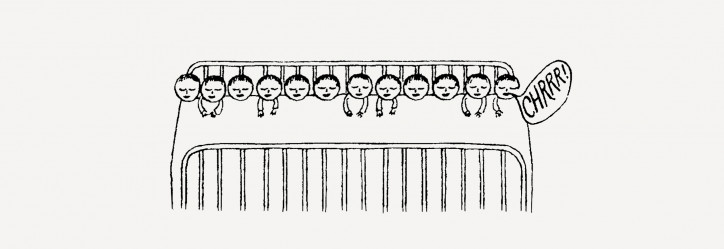
A more important substance for the state of sleep itself is adenosine, which is stored up in the brain throughout the day: the more of it there is, the stronger the “sleep pressure,”, which can be reduced only by sleeping. Drinking coffee, strong tea, or other caffeinated beverages, suppresses the action of adenosine, but doesn’t reduce the amount. So the longer we put off sleep, the harder our tiredness hits us—which anybody who’s experienced a caffeine crash can confirm.
If you have a habit of delaying the time you go to sleep, set an alarm: not just to help you wake up, but also to remind you to go to sleep at a regular time.
2. Be physically active. Exercise—in a form you enjoy and that works for your body—for at least half an hour a day. This will help you get rid of the stress that’s built up, speed up regeneration of your body, treat any inflammation, and rebuild muscle and reserves of glucose. Remember to exercise two or three hours before you go to sleep, because then the stimulative processes will fit perfectly with the drop in temperature and rising sleep pressure.
Exercise that loosens you up, relaxes you, and stabilizes your breathing is also a good way to cope when you can’t get to sleep. Get out of bed and exercise in dim light, until you get sleepy again.
3. Avoid caffeine and nicotine. Both substances not only hinder falling asleep, but also sleeping in the essential, alternating cycles of NREM and REM phases, which change around every ninety minutes. In each of the repeating phases, different things happen at different times. As such, going to sleep later causes a shortening of the whole sequence; if we lose one REM phase in the evening or morning, we deprive ourselves of other benefits. The rich effects of particular phases of sleep include putting memories in order (and deleting unnecessary ones), recording data and memories, reflection and integrating experiences, as well as awakening creativity. For these complex processes to be completed, the full sleep sequence must take place.
Meanwhile, caffeine suppresses the sleep pressure, but doesn’t reduce it at all. What’s more, it breaks down in the body over quite a long time, remaining present as long as eight hours after you drink a cup of coffee. Nicotine in turn makes sleep shallower, meaning it becomes easier to wake up in the night. Moreover, the desire for this addictive stimulant makes smokers wake up earlier. It’s worth remembering that both these substances interrupt and ruin sleep.
4. Don’t eat at night. Big portions of food carry the risk of indigestion, which interrupts sleep. Lying down horizontally after a meal increases the risk of reflux of stomach contents and acid into the esophagus. Nor is it a good idea to consume too many liquids before bed: the need to go to the bathroom wakes us up, interrupts our NREM and REM cycles, and thus reduces the quality of sleep.
Interestingly, thus far no research has shown whether what we eat affects the quality or length of our sleep. But gastroenterologists advise eating the final meal of the day at least three hours before bedtime.
5. Don’t nap after 3:00 p.m. Short naps are a great way to make up for a shortage of sleep. They’re recommended for people working certain jobs, such as pilots near the end of a long flight, because they give a short-term burst of energy and boost concentration. A brief siesta seems to have a great effect on the circulatory system. But if naps don’t meet the need to supplement your rest, they can make it hard to fall asleep at night. This quickly breaks up the diurnal rhythm, causing a vicious cycle: the later you go to bed and the sooner you interrupt your sleep, the more you supplement it with naps, and the harder it will be to fall asleep at night. It’s better to maintain the overwhelming need for rest until the night, when the growing sleep pressure will help you fall—and stay—asleep.
6. Avoid medications that cause insomnia. Read the fine print: popular allergy, heart, cough, and asthma medications can have effects that interfere with sleep. People with asthma should be particularly cautious.
It’s also worth treating the bedroom and bed as a space used only for sleep. Don’t laze around in the sheets after you wake up; don’t work in this space. In a nutshell: don’t teach your brain that it’s a good idea to do other things in bed. Techniques to slow down brain activity, such as meditation and breathing exercises, can also help you fall asleep, as can giving up on day-time naps.
Since 2016 the American Medical Association has recommended similar techniques as the main way of treating chronic insomnia. Unlike medications, they more frequently deliver long-term effects and don’t risk the return of insomnia often experienced after one stops taking sleeping pills. But they’re not always enough.
7. Don’t drink alcohol too late. Although it revives and stimulates us in its first phase alcohol is considered a depressant. That’s because it weakens the receptors and the transmission of electrical impulses in the brain, initially in the prefrontal cortex, which is why we feel that it relaxes us and encourages extroversion. Later it makes us sleepy and weakens awareness, but this doesn’t mean that it leads us into natural sleep.
Contrary to the stereotype, a glass of wine in the evening isn’t good for you. Alcohol divides sleep into short segments and causes us to wake up multiple times, which we generally don’t remember. Since it causes the production of aldehydes and ketones, it suppresses the REM phase—where we dream. It’s only then, when our brains are filled with dreams, that our bodies don’t produce noradrenaline, a hormone related to stress. As preliminary research shows, this is also the most likely time when a type of therapeutic “coming to terms” with our emotions happens, e.g. reliving traumas and alleviating them. Additionally, dreaming helps us understand our social environment, and orient ourselves with regard to other people’s moods and emotions. While it’s true that we still don’t know much about the functions of dreams, they seem to have great significance for our lives—it’s better not to disturb them.
Interruption of sleep phases can be caused by even a small amount of alcohol consumed after noon; a drink in the evening causes much greater harm. That’s why Walker, in Why We Sleep, advises stopping at the second glass of wine, or—jokingly—to drink only with breakfast, because then alcohol won’t manage to interfere with night-time sleep.
8. Take a hot bath. Do it for a completely different reason than you think. It may seem that the high water temperature and subsequent warming of the body make you sleepy, but actually the opposite is happening. A drop in body temperature of around 1°C—happens an hour or two after a bath (which should not be too long or too hot)—allowing melatonin and adenosine to do their work and support the diurnal rhythm, according to which the body cools down to fall asleep.
Research supporting this is also confirmed by Claudia Hammond in her book The Art of Rest, indicating a bath as the optimal pre-sleep activity—also because it’s deeply relaxing. A hot bath stimulates the body to send blood to its outer parts in order to release the heat. A cool bedroom also helps you fall asleep. Everyone can adjust the temperature to their needs, but various studies indicate that about 64°F is optimal for sleep. That’s why it’s not good to overheat the bedroom or wear pajamas that are too thick.
We can learn a lot about night-time temperature regulation from children: their hands and feet, sticking out from under the covers, are cooling their bodies so they can sleep long and pleasantly.
9. De-stress before bedtime. Though it’s harder and harder to maintain a buffer of relaxation time that divides our daily tasks from rest, ensuring a moment of de-stressing before going to sleep is key. Your mind, stimulated by movement, work, the light of lamps and screens, needs time to shift into sleep. We can’t fall asleep at will—hence the unpleasant feeling of tossing and turning in the sheets when after many hours of constant activity we need to “get our sleep in quick,” before the alarm goes off.
Stretch for ten to twenty minutes, listen to music or read: you’ll help yourself fall asleep smoothly and naturally. Rather than demanding the impossible simply slow down before bedtime.
10. Get out in the sun, and regulate light. To reinforce your diurnal rhythm, get up in the morning according to the sun. It’s optimal to get up after sunrise, helping flush from your system the last of the melatonin, which also strengthens its production after dark.
If you have to get up before dawn, it’s good to get a nice dose of bright light in the morning and to make sure things are dark in the evening. Apps can adjust screen brightness and intelligent lighting systems are also helpful.
11. Purge your bedroom of lights and gadgets. We already know the bedroom should be cool. But it’s also important for it to be dark and free from the 24-hour interrupters that emit light and notifications; making sleep shallow and demanding a reaction to every beep and vibration. If we sleep in the same room as our devices, our alertness is increased: we wait for signals rather than sleeping. We remain in standby mode,always ready to react. If it happens that you wake up in the middle of the night to update yourself, checking notifications, it means you’re starting to become like your smartphone, which you certainly don’t switch off overnight, and which never sleeps.
It’s worth removing all light sources from your bedroom. Since light pollution is a problem in growing swathes of the world—light spills into homes from the street, from nearby apartments and even from the bright, artificial glow of the city sky—it may be necessary to buy blackout blinds or curtains. It’s also important that in the bedroom—or anywhere else just before sleeping—you don’t use ceiling lights, instead choosing muted, yellow light, e.g. from a small bedside lamp.
It is worth avoiding the cool, blue light emitted by LEDs. This means you’re shooting yourself in the foot if you want to fall asleep naturally and deeply, but watch TV, or a series on your laptop, or read news on your smartphone, right before bed.
Try to cool and darken your bedroom and replace your smartphone with an alarm clock. Make yourself wake up day after day with a feeling of greater rest. It’s hard to measure sleep quality scientifically, but it’s easy to feel it.
12. Don’t try to force yourself to sleep. Various sources give a rule of twenty to twenty five minutes. If you’re still lying awake in bed after that amount of time, it’s better to get up and do some relaxing activity. Read a printed newspaper by the delicate light of a lamp; stretch; do breathing exercises; listen to a calm podcast or music. Wait for your body to desire sleep, and when drowsiness starts to take over, go back to bed. The anxiety of being unable to fall asleep only makes things worse. Rather than keeping track of the passing time, it’s a good idea to just turn your watch over.
Finally, a warning: researchers say our bodies need more sleep, even though we ourselves aren’t completely aware of this. To find your level, follow the first of the twelve tips, and after a period of regularly sleeping about eight hours a day, check whether you still need an alarm clock. If you regularly wake up earlier, with a feeling of satisfying rest, maybe you’re one of those people who needs less sleep.
For now we’re left to our own devices, because sleep medicine, though it’s definitely necessary, is only in its early days. Science is trying to find convincing evidence to confirm the grandmotherly wisdom that for most ailments and problems, the best medicine is a good night’s sleep. A constant lack of it destroys the refined sequence of processes essential for a healthy life. So if you’re already looking after your diet, physical activity, and breathing, it’s time to take a look at your night-time habits.
